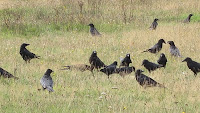
Earlier this month The New Media Consortium and JISC published
Technology Outlook: UK Tertiary Education 2011-2016. I have regularly reported on the annual publication of the main Horizon report, but I had missed that they also periodically publish more specific ones. You can find a link to all the reports on the JISC/ Horizon wiki at
http://jisc.wiki.nmc.org/home. There have been 3 Australia-New Zealand Horizons, there have been a couple on "K12" (schools), and also ones on Museums and the Iberoamerican perspective.
For the UK higher education one they mainly adopted a delphi approach, working with a small group from the education/technology field. The wiki I linked to above also has additional resources and discussion, and people are encouraged to add material in various ways.
I was just alerted to this today, by
a blog post from Peter Miller so I have only skimmed the wiki and report superficially, but that won't stop me from making a few comments. One is that it is definitely worth looking at, to learn and (in the UK anyway) to gauge the kind of assumptions and priorities that underly the report.
Unsurprisingly, there is a good deal of overlap between the main Horizon 2011 report (published at the start of the year) and the UK one. Cloud computing, which is one of the "one year or less" items in the UK report is an underpinning element in the main report. The highlighted technologies are: One year or less - cloud computing, mobiles, open content, tablet computing; 2-3 years - game-based learning, learning analytics, new scholarship, semantic applications; 4-5 years - augmented reality, collective intelligence, smart objects, telepresence.
Again unsurprisingly technology is centre stage, so (in my opinion) the need to (for learning and teaching applications) approach things from the learning need (rather than some technological requirement) gets a bit lost sight of.
I was also rather surprised that (for something aimed at the tertiary sector) the evidence and references were generally not that substantial e.g. quoting a
Huffington Post article by James Gee instead of his books or articles that made the same point. Although the report is looking to the future, there is really quite a lot of research (if small scale) into use of innovative technologies in learning and learning management: at any rate there are a lot of peer-reviewed articles and some theses, and it has certainly got beyond the point where you have to rely solely on trade, conference and news sources. I suppose that I might notice this particularly because I'm marking Masters dissertations at the moment, and looking for the quality of evidence that is cited, but in that I'm probably not atypical as an academic. A good number of my students are doing small scale investigations in the area of social media or gaming.
Just to get in a final point, unfortunately this UK report doesn't discuss the relevance of information literacy (though, interestingly, the Australian one does!); however the need for educators and students to have "digital media literacy" is emphasised. As far as I could see "digital media literacy" is not defined, but it does seem to include some elements of information literacy.
If you want to go straight to the UK report it's at
http://www.nmc.org/pdf/2011-Technology-Outlook-UK.pdf. Also the wiki is well worth investigating, as already mentioned.
Photo by Sheila webber: autumn blooms, September 2011
 The WILU 2012 (major IL Canadian) conference will held at Grant MacEwan University, Edmonton, Alberta, Canada from May 23-25, 2012.
The WILU 2012 (major IL Canadian) conference will held at Grant MacEwan University, Edmonton, Alberta, Canada from May 23-25, 2012.





















